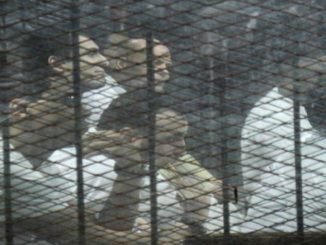
Egypt’s minister of Defense Sedki Sobhy has ratified the military court’s decision regarding case 174/west Cairo military court.
In May 2016, Egypt’s military court has issued death sentences to 8 defendants in the case 174/2015 west Cairo military court known in the media as “the Developed Mission” case.
The 8 defendants are Hamad Al-Ghazali, Mohamed Fawzi, Ahmed Mustafa Ahmed, Reda Moatamed, Mahmoud Al-Sharif, Abdel-Basir Abdel-Rauf, and two others in absentia: Abdullah Noureddine and Ahmed Abdel-Bassit. In addition, the ruling stated a life sentence to 12 defendants; Khaled Ahmed Mostafa, Ahmed Magdy al-Sayed, Omar Mohamed Aly, Abdullah Kamal Hassan, Sohaib Mohamed, Ahmed Mohamed Soliman, Kahled Gamal Mohamed (in absentia), Mostafa Ahmed Amin (in absentia), Hassan Abd al-Ghaffar (in absentia), Ahmed Saad Ismail (in absentia), Islam Abd al-Sattar (in absentia), and Abd AL-Raheem Mabrouk (in absentia). In addition, the military court’s ruling has stated rigorous imprisonment for 15 years against 6 more people: Abdullah Sobhy, Hashem Mohamed al-Sayed, Abdul Rahman Ahmed, Mohamed Mohsen Mahmoud, Yasser Aly Ahmed, and Ehab Ameen. The court also acquitted two of the defendants.
‘No Military Trials for Civilians’, an Egyptian rights group , formed by lawyers and human rights activists in 2011, said that “Most defendants were arrested within the period between May 28th to June 15th, 2015. All were abducted and subjected to forced disappearance and torture. Detention locations varied between Lazoghly, Military Intelligence and Azouly prison (Omar Mohamed and Sohaib Saad were held at Lazoghly for 2 days, then transferred to the Military Intelligence premise).
According to a Human Rights Watch (HRW) report released in 2016, military courts have tried at least 7,420 Egyptian civilians since October 2014, when Abdel Fattah al-Sisi decreed a new law that expanded military court jurisdiction.



